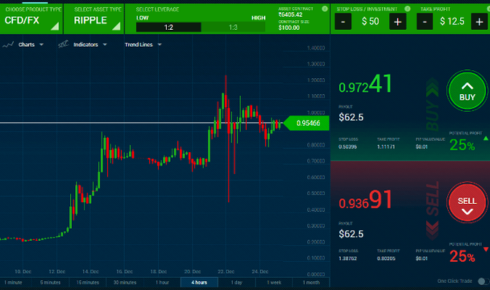
The Mainboard IPO process is a key avenue for companies to raise capital in the stock market. This article explores the fundamentals of Mainboard IPOs, shedding light on how they work and why they are a magnet for significant investors. HDFC SKY, the discount-broking platform by HDFC Securities, is a comprehensive platform providing easy access to various investment opportunities, making it an ideal gateway for participating in Mainboard IPOs.
Understanding Mainboard IPOs
HDFC SKY, developed by HDFC Securities, is a cutting-edge discount-broking platform that caters to the modern investor’s needs. One of the key features of HDFC SKY is its seamless access to a wide range of investment options, including Indian equities, ETFs, mutual funds, IPOs, derivatives, commodities, currencies, and global stocks. This comprehensive offering allows investors to diversify their portfolios and capitalize on various investment opportunities across different asset classes. Moreover, HDFC SKY stands out for its user-friendly interface and intuitive tools, making it easier for both novice and experienced investors to navigate the platform efficiently.
Mainboard IPO offers an exciting gateway for investors to access potential high-growth opportunities during a company’s initial public offering. It provides a platform for both seasoned and new investors to partake in primary market equities. HDFC SKY simplifies this process, ensuring users remain informed and responsive to new listings.
One of the standout features of HDFC SKY is its focus on Mainboard IPOs, providing investors with the opportunity to participate in initial public offerings of established companies. Mainboard IPOs are offerings made by companies that meet stringent regulatory requirements and are listed on recognized stock exchanges. By offering access to Mainboard IPOs, HDFC SKY enables investors to invest in companies with proven track records and potential for growth. This not only allows investors to diversify their portfolios but also provides them with the chance to capitalize on the early stages of a company’s listing, potentially reaping significant returns in the long run.
The Process of Mainboard IPOs
The process of mainboard initial public offerings (IPOs) involves several key stages that companies go through to offer their shares to the public for the first time. For HDFC SKY, by HDFC Securities, the process typically begins with the company selecting investment banks to underwrite the IPO and help with the regulatory requirements. These banks play a crucial role in evaluating the company’s financials, determining the IPO price, and marketing the offering to potential investors. The company then files a prospectus with the regulatory authorities, providing detailed information about its business, financials, and the intended use of the proceeds from the IPO. This prospectus serves as a key document for investors to make informed decisions about whether to participate in the IPO.
Once the regulatory authorities approve the IPO, the company embarks on a roadshow to generate interest from institutional and retail investors. This roadshow involves presentations by company executives and underwriters to showcase the business and its growth prospects. Investors then have the opportunity to place their orders for shares at the IPO price. Finally, on the listing day, the company’s shares are officially introduced and traded on the mainboard of the stock exchange, providing investors with the opportunity to buy and sell shares in the secondary market. This process of mainboard IPOs is a significant milestone for companies like HDFC SKY, allowing them to raise capital for growth and providing investors with a chance to participate in the company’s success.
As investors eagerly anticipate the upcoming IPO 2025, it promises to be a highly significant event in the stock market landscape. Companies preparing for this milestone are keen to capitalize on growing market trends, offering investors a fresh opportunity to diversify their portfolios by participating in high-potential ventures.
Key Players in Mainboard IPOs
HDFC SKY, by HDFC Securities, stands out as a key player in mainboard IPOs due to its innovative approach to discount broking and comprehensive services. As a modern discount-broking platform, HDFC SKY offers investors seamless access to a wide range of investment opportunities, including Indian equities, ETFs, mutual funds, IPOs, derivatives, commodities, currencies, and global stocks. With features like zero account-opening charges and a flat ₹20-per-order brokerage fee, HDFC SKY provides cost-effective solutions for investors looking to participate in mainboard IPOs. Additionally, the platform’s lifetime free ETFs, interest-bearing margin trading, expert research, and intuitive tools contribute to a user-friendly and efficient investment experience for IPO participants.
The expert research provided by HDFC SKY adds value to investors, helping them make informed decisions when considering mainboard IPOs. By offering detailed insights and analysis on upcoming IPOs, HDFC SKY enables investors to evaluate the potential of new listings and make strategic investment choices. The platform’s user-friendly interface and intuitive tools further enhance the IPO participation process, making it easier for investors to navigate the complexities of the primary market. With its focus on providing accessible and affordable investment solutions, HDFC SKY plays a crucial role in empowering investors to capitalize on mainboard IPO opportunities and build a diversified investment portfolio.
Benefits of Mainboard IPOs for Companies
Mainboard IPOs offer several benefits for companies looking to raise capital and expand their business operations. Firstly, going public through a mainboard IPO provides companies with access to a larger pool of investors, including institutional investors, which can help in diversifying their shareholder base and increasing liquidity in their stock. This increased visibility and accessibility can also enhance the company’s credibility and reputation in the market, potentially attracting more business opportunities and partnerships. Additionally, the capital raised through a mainboard IPO can be utilized for various purposes such as funding growth initiatives, expanding operations, reducing debt, or investing in research and development, thereby fueling the company’s long-term sustainability and competitiveness in the market.
Furthermore, mainboard IPOs can also offer companies a platform for potential valuation gains and increased market capitalization. By going public, companies can establish a transparent valuation benchmark based on market demand and investor sentiment, which can support future fundraising activities and strategic decisions. The heightened market exposure resulting from a mainboard IPO can also lead to increased analyst coverage and research, providing investors with more insights into the company’s performance and growth prospects. Overall, mainboard IPOs can serve as a catalyst for companies to achieve their strategic objectives, enhance their market position, and create value for their shareholders.
Risks and Challenges of Mainboard IPOs
Mainboard IPOs come with a variety of risks and challenges that both companies and investors need to be aware of. One of the key risks is market volatility, as the performance of an IPO can be heavily influenced by the overall market conditions at the time of listing. Companies need to carefully time their IPOs to ensure they launch during a favorable market environment. Another challenge is the high level of scrutiny and regulation that comes with listing on the mainboard. Companies need to meet stringent requirements regarding financial reporting, governance, and transparency, which can be time-consuming and costly. Additionally, the valuation process for an IPO can be complex and subjective, leading to potential disagreements between the company and investors over the true value of the business.
BSE share price can be affected by numerous factors, making forecasting challenging. Fluctuations in investor sentiment and broader economic changes can lead to unpredictable price movements post-IPO. Companies must communicate effectively to maintain investor confidence and manage expectations. These dynamics require strategic planning and adept market navigation to achieve successful outcomes.
For investors, one of the risks of mainboard IPOs is the potential for overvaluation. Due to the hype surrounding new listings, companies may be priced higher than their actual worth, leading to a possible market correction once the IPO euphoria fades. Another challenge is the lack of historical data available for newly listed companies, making it difficult for investors to accurately assess the company’s performance and future prospects. Additionally, liquidity can be a concern for investors in mainboard IPOs, as there may be limited trading volume initially, leading to difficulties in buying or selling shares at desired prices. Overall, while mainboard IPOs offer significant opportunities for companies to raise capital and investors to participate in new offerings, they also come with inherent risks and challenges that require careful consideration and due diligence.
Mainboard IPO Pricing Strategies
Mainboard IPO pricing strategies play a crucial role in determining the success of an initial public offering (IPO). One common strategy is fixed price offering, where the price is predetermined by the issuer. This strategy provides clarity to investors and can help in generating interest among retail investors. Another approach is the book-building process, where the price range is set based on investor demand. This strategy allows for price discovery and can result in a better valuation for the company. Additionally, the Dutch auction method allows investors to bid on the price they are willing to pay, which can lead to a fair market price for the IPO.
HDFC SKY, offered by HDFC Securities, can facilitate the process of investing in IPOs by providing its users with access to a wide range of investment opportunities. With zero account-opening charges and a flat brokerage fee, HDFC SKY offers cost-effective solutions for investors looking to participate in IPOs. The platform’s expert research and intuitive tools can assist investors in making informed decisions when it comes to IPO investments. Additionally, the interest-bearing margin trading feature can provide leverage to investors looking to maximize their returns in the IPO market.
Evaluating Mainboard IPO Investment Opportunities
Evaluating mainboard IPO investment opportunities on HDFC SKY involves a thorough analysis of various factors to make informed decisions. Firstly, investors need to assess the company’s financial performance, growth potential, industry trends, and competitive positioning. This involves studying the company’s revenue streams, profitability ratios, debt levels, and future expansion plans. Conducting a SWOT analysis can help in understanding the strengths, weaknesses, opportunities, and threats associated with the IPO investment. Additionally, considering the market conditions, macroeconomic factors, and regulatory environment is crucial to gauge the potential risks and rewards of investing in the IPO.
Furthermore, investors using HDFC SKY for mainboard IPO investments can leverage the platform’s expert research and intuitive tools to enhance their decision-making process. Access to in-depth research reports, market insights, and analyst recommendations can provide valuable insights into the IPO issuer and its industry dynamics. Utilizing these resources can help investors evaluate the IPO’s valuation, growth prospects, and overall attractiveness as an investment opportunity. By leveraging HDFC SKY’s user-friendly interface and comprehensive market data, investors can stay updated on the latest IPO offerings, track market trends, and make well-informed investment decisions in the dynamic Indian equities market.
Mainboard IPO Regulations and Compliance
Mainboard IPO regulations and compliance in India are overseen by the Securities and Exchange Board of India (SEBI), which governs the primary market activities of companies going public. Companies like HDFC SKY, by HDFC Securities, must adhere to SEBI guidelines to ensure a smooth Initial Public Offering (IPO) process. These regulations are designed to protect investors, promote transparency, and maintain market integrity. Companies must comply with various requirements, including disclosing financial information, corporate governance practices, and complying with listing agreements. SEBI also mandates that companies appoint merchant bankers and legal advisors to ensure compliance with regulatory frameworks.
For HDFC SKY, compliance with Mainboard IPO regulations is crucial to build investor trust and credibility in the market. By following SEBI guidelines, HDFC SKY can demonstrate its commitment to transparency and regulatory compliance, which can enhance investor confidence in its IPO. Compliance with regulations also helps HDFC SKY to avoid legal issues and penalties, ensuring a smooth IPO process. Additionally, adherence to compliance requirements can lead to better valuation and market reception for the IPO, ultimately benefiting the company and its stakeholders.
Trading App provides investors with a seamless platform to engage with HDFC SKY’s IPO, offering access to all necessary information and updates. By leveraging this Trading App, investors can track compliance adherence, monitor market trends, and make informed decisions. This transparency reinforces investor trust and ensures a comprehensive investment experience.
Mainboard IPO Success Stories
HDFC SKY, by HDFC Securities, has emerged as a standout success story in the Mainboard IPO space due to its innovative approach and customer-centric features. The platform’s emphasis on providing seamless access to a wide range of investment options, including Indian equities, ETFs, mutual funds, IPOs, derivatives, commodities, currencies, and global stocks, has resonated well with investors. The zero account-opening charges and flat ₹20-per-order brokerage, coupled with lifetime free ETFs, have made investing more accessible and cost-effective for users. Additionally, the platform’s interest-bearing margin trading facility, expert research, and intuitive tools have empowered investors to make informed decisions and navigate the complexities of the market with confidence.
The success of HDFC SKY in the Mainboard IPO arena can be attributed to its commitment to offering a comprehensive and user-friendly experience to investors. By leveraging technology and innovation, HDFC Securities has created a platform that caters to the diverse needs of investors, enabling them to participate in IPOs with ease and efficiency. The platform’s user-friendly interface, coupled with expert research insights, has helped investors make well-informed decisions while investing in IPOs. Furthermore, the emphasis on providing a cost-effective investment solution through the flat brokerage fee and free ETFs has positioned HDFC SKY as a preferred choice for investors looking to capitalize on Mainboard IPO opportunities.
Comparing Mainboard IPOs to Other Listing Options
Mainboard IPOs are a popular option for companies looking to raise capital through the stock market. Compared to other listing options, such as SME IPOs or listing on the BSE Startups platform, mainboard IPOs offer greater visibility and credibility to potential investors. Companies opting for a mainboard IPO can benefit from access to a larger pool of investors, including institutional investors, which can help in achieving a higher valuation for the company. Additionally, mainboard IPOs are subject to stricter regulatory requirements, which can provide assurance to investors about the transparency and governance standards of the company.
On the other hand, while mainboard IPOs offer several advantages, they also come with higher compliance costs and listing requirements. Companies considering a mainboard IPO must meet stringent eligibility criteria set by the stock exchanges and regulatory authorities, which can include minimum track record, profitability, and net worth requirements. Moreover, the process of conducting a mainboard IPO can be more time-consuming and expensive compared to other listing options. Despite these challenges, mainboard IPOs remain a preferred choice for established companies looking to raise significant capital and enhance their brand visibility in the market.








